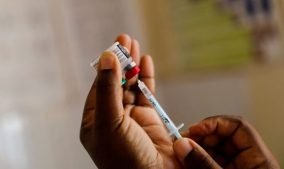More than ever, South African homes are facing hunger and higher levels of poverty, says Human Sciences Research Council’s (HSRC) Dr Priscilla Reddy.
She was speaking at a virtual conference organised by the Department of Higher Education, Science and Technology.
The council has been engaged in a number of major population representation surveys, since the beginning of the COVID-19 pandemic one year ago. This was aimed at determining the social, psychological and economic impact the pandemic has had on the lives of citizens.
While many have adjusted to the new normal, Reddy says the psychological implications of the pandemic will leave a lasting impact.
“The COVD-19 pandemic has had a profound impact on all South Africans, 7.2 million in the last quarter have been unemployed. There has been a loss of income and salaries have been cut. What we found in the early days of the pandemic were heightened job losses, pressure on bread winners to support their families. New data shows that all these numbers have increased. Almost 1 in 4 people say they do not have enough money to buy food, 16% of households reported that their children were hungry, ” explains Dr Reddy.
The implications of dealing with a shift in daily life, the loss of income and the death of close family has increased reports of anxiety and depression in the country. Dr Reddy says this could have far reaching consequences.
“From July to December, the number of South Africans screening positive for depression increased from 24 to 29%. November to December, 2 in 3 South Africans reported experiencing hunger everyday had depressive symptoms. These are serious mental health issues. Healthcare workers, especially nurses reported high levels of psychological distress. We see over the past 3 months, the total number of COVID deaths doubled from 20 000 to 49 000. We had more mourning with the loss of loved one’s. This is highly challenging as people feel less in person support by mourning in isolation. The liability of not being able to perform funeral rights has added another layer of grief which is prolonged,” the researcher adds.
The vice president of Research at the South African Medical Research Council (SAMRC) and member of the Ministerial Advisory Committee on Vaccines, Dr Jeffrey Mphahlele, says while the world has suffered from the ripple effects of COVID-19, the only way to begin to repair the damage is through mass vaccination.
“We know that if there is anything that we need to end the acute phase of the pandemic, it’s vaccines. Vaccines will always remain at the cornerstone of containing infectious disease. The virus has proven to be a moving target. We are still learning a lot about the genetic evaluation of the virus, immunity to the virus. At the moment, we don’t have any immunity to the virus. All the vaccines that are being used, are used under emergency authorisation,” says Dr Mphahlele.
According to Statistics SA, the country’s official unemployment rate during the fourth quarter of 2020 rose to a record high of 32.5%. This coupled with high food prices indicates the devastation the COVID-19 pandemic has caused to households.
Senior research specialist in the Economic Performance and Development unit at the Human Sciences Research Council, Dr Alexis Habiyaremye, says government needs to begin partnering with the banking sector, if the economy is to be reignited.
“All of this devastation calls for intervention, even before the pandemic, the South African government and economy were not doing well. It needs to engage with the private sector and the central banks, to have some intervention and macro economic tools. Creating jobs costs a lot of money. The calculations that have been made by the institute of economic justice points to 6 or 7 jobs created for each million rand of extra spending,” says Dr Habiyaremye.






